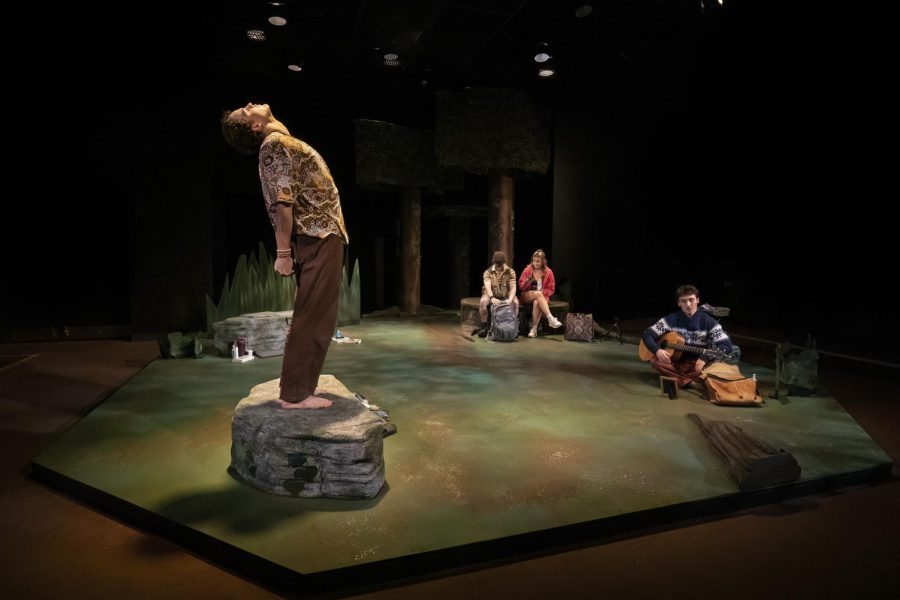Review: “Small Mouth Sounds” returns to the stage with UA Theatre and Dance
November 13, 2022
Running from Monday, Nov. 7, to Sunday, Nov. 13, The University of Alabama Department of Theatre and Dance produced “Small Mouth Sounds” at the Allen Bales Theatre. Within the runtime of an hour and a half, the play balances tragedy with elements of satire and discussions of spirituality, empathy and healing.
Directed by Ashley White, a third-year MFA candidate with a concentration in directing, the play largely stayed true to the original, quirky script written by Bess Wohl in 2017.
In the beginning, there was light illuminating the forest setting that would eventually be home to six characters running away from their mundane modern city lives. Guiding the six in their journey to peace and hopeful happiness is their spiritual guide. The guide is heard and not seen; he represents higher power that will lead the lost sheep to greener pastures.
Each character is unique with their own motivations, struggles, ways of expression and goals that separate them from their peers.
Each cast member does an incredible job managing the complexity that Wohl intended for each character. Delivering performances with a lot of passion without the use of words, the seven cast members embrace their characters’ vow of silence and instead use body language to portray their intentions, their developing relationship with the other characters, and the revelations of their fears and frustrations that brought them to seek peace and emotional healing.
White said it was important to her to stay true to the script so the scenes would accurately convey Wohl’s message.
However, she did take a few creative liberties. There’s a particular scene when the guru character, Rodney, takes a simple moment with incense to establish his character as a cocky man who is unafraid to take up space in spite of the annoyance it caused his “bunkmate,” Ned. It served the additional purpose of cementing the opposing traits of the awkward tragedy that is Ned, a desperate man who doesn’t take up much space in the world. In this way, Rodney and Ned prove to be opposites.
The originality of Wohl’s agenda was kept while also adding something small yet special. White said while Wohl’s work was the blueprint and the “framework,” the amount of detail taken to depict her vision speaks to the creative directory.
The play begins with the story of a frog that leaves its home and dies after its visit to the ocean. As the characters spend their days at the retreat they bond with one another, learning to process and communicate their issues and let go of their pain. In the end, the muttering of a single word, “Ocean,” is said by the Finnish man, Jan. He is left alone as the golden light illuminating the stage fades.
Its meaning, its interpretation and its purpose are left untold, but in Wohl fashion, the ending’s intention is for the audience member to decide. The word “ocean” is the connecting thread from the beginning of the story to this ending, like a thesis to its concluding paragraph. The vague ending is an additional element to the story that makes it all the more thought provoking as the audience leaves somewhat befuddled by the masterpiece.
“[It’s] one of those things where we all sort of have our own different interpretation of ‘ocean’ and what it means,” White said.
Audience and actors decide what the word, and the play, mean to them.
For more information on upcoming UA Theatre and Dance shows, visit their website.








